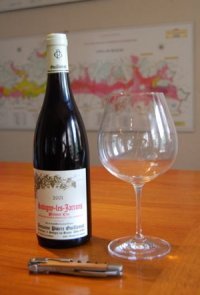How to Taste Wine
 So you want to learn about wine? Well one of the first steps is learning how to taste wine appropriately so that you can get the most out of each new wine experience. By focusing on several important aspects in each wine tasting you help to refine your palate, pick out subtle details, and really understand the wine. This helps take the experience of wine tasting from a simple consumption of a beverage to new heights of appreciation! So you want to learn about wine? Well one of the first steps is learning how to taste wine appropriately so that you can get the most out of each new wine experience. By focusing on several important aspects in each wine tasting you help to refine your palate, pick out subtle details, and really understand the wine. This helps take the experience of wine tasting from a simple consumption of a beverage to new heights of appreciation!
Wine appreciation, just like appreciating any art, requires experience to develop. The first time you taste a wine, you don't notice all the details. Some of these subtleties get lost on the novice. Only after tasting many wines and analyzing them in depth can you start to see these subtleties, both the good and the bad, and to distinguish a good wine from a poor one and to distinguish a good wine from a truly great one. Therefore, knowing how to taste wine as you get started is critical to avoid missing anything. Other tips like taking wine tasting notes in a wine tasting journal can help you to hone your appreciation, focus on details and to remember one wine from the next.
In the end, whether you like a wine will come down to your own personal taste and preferences, but the info in this section can help you to get started so that you will maximize each new wine and start to learn how to analyze the different components each wine.
- How to Taste Wine: This is the nitty gritty, the basics about how to actually physically and mentally focus on a wine from all the necessary angles and evaluate it in an accurate and complete way. While a gut instinct, or gestalt, feeling about a wine can be very telling, paying attention to each of the components of a wine really brings out more complexity and subtlety from your tasting experience.
- The Basics - an overview
- Wine Color and Appearance
- Wine Aroma - "the Nose"
- Wine Flavor - "the Mouth"
- Wine Tasting Terms: The terms used to describe wines can be confusing to those of you new to tasting wine. Here is a list of some of the more commonly used terms and descriptions of their meaning.
- Corked Wine: The most common flaw in bottled wine, most people don't know what it means for a wine to be "corked". Find out what it means and how to spot it here!
- Wine Tasting Notes: Taking notes on wines you taste may seem a bit silly, but it helps you to focus on the aromas and flavors and to remember each wine you sample.
- Wine Tasting Notes Templates: Here are a few downloadable and printable templates for wine tasting notes and wine scoring.
- Wine Tasting Journal: A journal helps you to keep all your tasting notes in one place so that you don't loose them and can refer back to them at a later date. Carrying one around also makes you look like quick the experience wine professional!
- Wine Tasting Flavor Wheel: When first learning how to taste wine, it may be hard for you to come up with descriptors for the aromas and flavors you are experiencing. These handle tools help you to figure out what it is you are recognizing to hone your nose and palate into a well-trained sensory powerhouse.
- Wine Tasting Etiquette: Most beginners are worried about how to conduct themselves at their first wine tastings either in a winery tasting room or a wine tasting party. Will I do something silly and everyone will laugh at me? No! Don't worry! Here are a few tips to make you more comfortable.<.li>
| Support our website by buying your wine and wine accessories from one of our affiliates: |
|---|
Wines - Have great wines shipped to your door from one of the following great online wine sources. Most also have wine tasting packs, gift certificates and wine clubs!
  |
Go back to the top of the How to Taste Wine page.

|




 So you want to learn about wine? Well one of the first steps is learning how to taste wine appropriately so that you can get the most out of each new wine experience. By focusing on several important aspects in each wine tasting you help to refine your palate, pick out subtle details, and really understand the wine. This helps take the experience of wine tasting from a simple consumption of a beverage to new heights of appreciation!
So you want to learn about wine? Well one of the first steps is learning how to taste wine appropriately so that you can get the most out of each new wine experience. By focusing on several important aspects in each wine tasting you help to refine your palate, pick out subtle details, and really understand the wine. This helps take the experience of wine tasting from a simple consumption of a beverage to new heights of appreciation!




